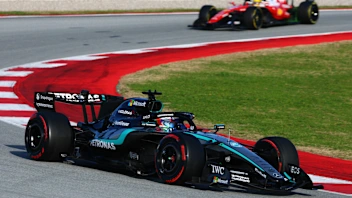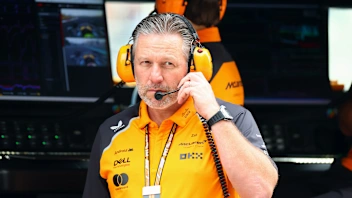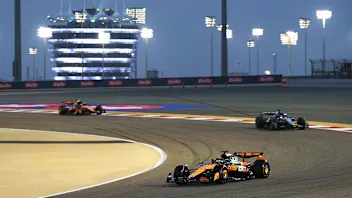For many, Ayrton Senna’s controversial comings together with Alain Prost in 1989 and 1990 are the first things that spring to mind when Suzuka is mentioned. But how well do you remember these other moments at Japan’s legendary figure-of-eight circuit?
Wet-weather prowess keeps Hill in title contention, 1994
Michael Schumacher earned the nickname ‘Regenmeister’ (rain master) for his prowess in wet conditions, but at Suzuka in 1994 the German had to doff his cap to rival Damon Hill, who, against the odds, produced a scintillating performance in atrocious conditions to keep the title race alive. Decided on aggregate times because of a lengthy red-flag stoppage brought about by worsening rain and multiple accidents, Hill overhauled a 6.8s deficit to Schumacher to win by 3.3s - even surviving a problematic pit stop during which one of his tyres jammed on. “"You keep telling yourself to be realistic: it is a tall order to beat Michael as this year he has been the class of the field,” said Hill afterwards. “It was just a question of taking as many risks as I could not to let any of my advantage slip away.”
Home hero Kobayashi races to the podium, 2012
The fans that flock to Suzuka every year are amongst the most passionate in the world, but in the years following Aguri Suzuki’s breakthrough podium in 1990 they hadn’t had much home success to cheer. Step forward Kamui Kobayashi. On a dream weekend, the Sauber ace bagged fourth on the grid in qualifying, which became third when Jenson Button received a five-place grid drop for a gearbox switch. Great achievement though that was, many expected him to go backwards in the race, but under intense pressure from Button behind, Kobayashi coolly hung on to record his first - and Japan’s third - F1 podium finish. “It hasn't sunk in yet, it is hard to believe” Kobayshi beamed afterwards. “Only during the final lap did I allow myself to really think I can keep him [Button] behind me, because then the best overtaking opportunity at the end of the straight was over, and then I saw all the fans and the raised hands…”
Ferrari spoil Honda’s party, 1987
F1’s maiden visit to Suzuka in 1987 was also the first Grand Prix in Japan for ten years, and no one was more desperate for victory than Honda. “We have to win,” said Soichiro Honda in no uncertain terms in the build-up to the event. But just as the Japanese manufacturer had dominated on Ferrari’s home soil in Italy two months earlier, so the Prancing Horse were victorious on Honda’s patch, with Gerhard Berger brilliantly ending a 38-race victory drought for the Scuderia. As for Honda, with Williams' Nigel Mansell ruled out of the race following a qualifying crash and his newly-minted world champion team mate Nelson Piquet having taken his foot off the gas as a result, it fell to Ayrton Senna to uphold Japanese honour, with the Brazilian sweeping past Stefan Johansson’s light-on-fuel McLaren on the final lap to take second in his Honda-powered Lotus.
Raikkonen goes back to front, 2005
One-lap qualifying wasn’t to everybody’s taste, but at Suzuka in 2005, the session’s unique peculiarities laid the foundations for one of the greatest drives of recent years, as rain consigned Michael Schumacher, Fernando Alonso and Kimi Raikkonen towards the back of the grid. All three would climb through the order in the race (Alonso and Schumacher enjoying a memorable set-to at 130R), but none would climb as high as Raikkonen who, scenting blood in the water, was relentless in his pursuit of erstwhile race leader Giancarlo Fisichella. The denouement came at the beginning of the final lap, as Raikkonen capped his remarkable rise from 17th by sweeping past the Italian. Could Fischella have defended harder? Definitely, but you get the sense that on that day, Raikkonen was not to be denied.
Grosjean incurs Webber’s wrath, 2012
After causing a massive pile-up on the run down to the first corner in Belgium in 2012, Romain Grosjean was handed a one-race ban for the following round in Italy. But just three races later in Japan he found himself in hot water again, this time after a clash with Red Bull’s Mark Webber. "The rest of us are trying to fight for some decent results each weekend but he is trying to get to the third corner as fast as he can at every race,” said Webber, undiplomatically referring to the Frenchman as ‘the first-lap nutcase’. “How many times can you make the same error? Maybe he needs another holiday…” Thankfully for Grosjean, who admitted it was a ‘stupid crash’, the stewards didn’t follow the Australian’s advice, settling on a ten-second stop-and-go penalty instead.
Comeback drive nets Senna first title, 1988
Ayrton Senna was involved in four title deciders at Suzuka in four successive years, but while the middle two were settled amid huge controversy and rancour, the first was decided simply by the Brazilian’s driving brilliance and iron will. Senna had beaten McLaren team mate and title rival Alain Prost to pole, but his slender advantage disappeared in an instant at the start when his car stalled was engulfed by the field. However, that would prove the prelude to a mighty comeback drive, initiated when the Brazilian used the sloping starting grid to bump-start his car back to life and completed when he swept past Prost some 28 laps later. “I feel as if I’ve lost a great weight from my shoulders,” said Senna afterwards. “Because of my terrible start, the race was amazingly hard, through the traffic, through the slippery conditions. Until today I always said my best drive was at Estoril in ’85 - my first win. But not any more: this was my best.”
Schumacher stall helps Hakkinen to title, 1998
Was Jarno Trulli responsible for the destiny of the 1998 world title? Not directly, but in stalling his Prost at the first start at Suzuka, the Italian forced a second start which polesitter and championship hopeful Michael Schumacher then fluffed, relegating him to the back of the grid. “That relieved the pressure a little bit,” said Mika Hakkinen, who entered the season finale four points clear of his rival. “But I knew he would be quick and that he would carve his way through the field.” As the Finn predicted, Schumacher duly climbed to third before his title challenge was spectacularly ended by a tyre blowout, handing Hakkinen a first drivers’ crown and McLaren their first titles since 1991. “When I saw Michael’s Ferrari parked beside the track, I knew it was over,” Hakkinen continued. “I started whistling to myself in the car, and slowed down a bit. Then the team came on the radio and told me to speed up, go for the win. But there was no rush. I’m very happy. We’re all very happy. And I guess everybody in Finland is upside-down!”
Kvyat rolls out of qualifying, 2015
"I’d never rolled a car, so unfortunately there's a first time for everything…” That was Daniil Kvyat’s matter-of-fact summing up of his huge crash and barrel roll during Q3 in Japan last year. "You always try to straighten the braking for that corner and I probably did it too much and I just touched the grass there,” said the Russian. "It happens sometimes - it was my mistake, my error. Nothing special. I'm mostly sorry for the guys who will have quite a big job." That ‘big job’ entailed Red Bull building up an entirely new chassis for the race, which was not surprising considering the size of the impact. “They told me it was 20g or something,” said Kvyat. “I'm not sure - I thought I could do better than that!”
Schumacher ends Ferrari’s title drought, 2000
When Michael Schumacher joined Ferrari in 1996 he made it his ambition to win the Scuderia their first drivers’ crown since Jody Scheckter’s in 1979. The German went close in ’97 and ’98 before breaking his leg while in contention in ’99. But at Suzuka in 2000 Schumacher finally ended 21 years of hurt for the Prancing Horse with a dramatic defeat of title rival Mika Hakkinen. “At the start, Mika was very quick and there was nothing I could do,” said Schumacher, who crossed the line just 1.8s ahead of the Finn. “We made some adjustments at the first stop and they helped. Then we saw Mika going in for his second stop and I still had two laps to go. That was the crucial time, but I had some traffic and a Benetton had spun and was moving backwards in front of me as I came into the pits. I did not think I had done enough. But as I went down the pit lane, Ross Brawn was saying ‘it’s looking good, it’s looking good’. Then he said ‘it’s looking bloody good!’ It was the most amazing moment of my racing career!”
Vettel sees off title rivals in incident-riddled race, 2010
To say the 2010 race at Suzuka began with a bang would be a lie, because it began with several of them. The race hadn’t even started when Lucas Di Grassi had a huge accident in his Virgin at 130R, then soon after the lights went out Vitaly Petrov, Felipe Massa, Nico Hulkenberg and Tonio Luizzi were all eliminated as a result of substantial accident damage. The fast-starting Robert Kubica was next to succumb, falling out of second when his rear wheel fell off - a fate that would also befall Nico Rosberg some 45 laps later. Remarkably all five drivers still in contention for that year’s title - Sebastian Vettel, Mark Webber, Fernando Alonso, Jenson Button and Lewis Hamilton - managed to avoid the chaos and misfortune, with Vettel eventually leading that same group home to move himself into joint second in the standings.
Next Up
Related Articles
/16x9%20single%20image%20-%202026-02-11T160545.779.webp) Norris heads Verstappen and Leclerc on first test day in Bahrain
Norris heads Verstappen and Leclerc on first test day in Bahrain Vote for your favourite 2026 F1 livery
Vote for your favourite 2026 F1 livery Brown confident McLaren will be ‘competitive’ in 2026
Brown confident McLaren will be ‘competitive’ in 2026 ExplainedWhat to expect from pre-season testing in Bahrain
ExplainedWhat to expect from pre-season testing in Bahrain/16x9%20single%20image%20-%202026-02-11T154558.325.webp) AS IT HAPPENED: Day 1 of pre-season testing in Bahrain
AS IT HAPPENED: Day 1 of pre-season testing in Bahrain/16x9%20single%20image%20-%202026-02-11T154917.365.webp) Hamilton reflects on decision to change race engineer
Hamilton reflects on decision to change race engineer